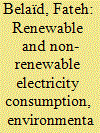|
|
|
Sort Order |
|
|
|
Items / Page
|
|
|
|
|
|
|
| Srl | Item |
| 1 |
ID:
164212


|
|
|
|
|
| Summary/Abstract |
MARITIME FREIGHT is a priority development area of the European Union transportation industry. In 2016, 75.5% (1,783.2 million [metric] tons) of the EU's international cargo (2,362.8 million tons) was shipped by sea.
|
|
|
|
|
|
|
|
|
|
|
|
|
|
|
|
| 2 |
ID:
120901


|
|
|
|
|
| Publication |
2013.
|
| Summary/Abstract |
The authors propose a classification of the perceived corruption levels of Mediterranean countries according to key political, economic, and social factors. While relevant empirical research has shown the extent of corruption in various countries by analyzing differences in their respective values on a corruption perceptions index, the variables used here include additional data such as gross national income per person in purchasing power parities, a political rights index, a civil liberties index, and a nonincome human development index. Although northern Mediterranean countries are distinguished from Arab and Balkan countries, the labels developed and developing countries in the Mediterranean seem too simplistic when describing the marked heterogeneity within these two groups. The lack of homogeneity can be attributed to institutional and cultural country- specific factors rather than to crude differences in levels of economic development. This suggests that policies against corruption should target a complex ensemble of driving factors not limited to the economic characteristics of an individual country and should include social political, cultural, institutional, and territorial considerations.
|
|
|
|
|
|
|
|
|
|
|
|
|
|
|
|
| 3 |
ID:
168701


|
|
|
|
|
| Summary/Abstract |
In this article, we develop an empirical model to investigate the causal link amid renewable and non-renewable electricity consumption, GDP and carbon emissions by using a panel of 9 Mediterranean countries over the period 1980–2014. Using the PMG panel ARDL and panel econometric technics, heterogeneity and cross-sectional dependence among the panel were considered to explore the long and short-run dynamic relationships as well as the validity of a proposed model. The results provide panel empirical evidence that there is short-term bidirectional causality between GDP, renewable electricity consumption and CO2 emissions and between non-renewable electricity consumption, GDP and renewable electricity consumption. For the long-term causal relationship, the result indicates that there is bidirectional causality between non-renewable electricity consumption and CO2 emissions. However, there is evidence of unidirectional causal relationships from GDP to CO2 emissions and non-renewable electricity consumption and from renewable electricity consumption to CO2 emissions. The findings imply that non-renewable electricity consumption and economic growth stimulate CO2 emissions in southern and northern Mediterranean countries, while renewable electricity reduces them. This empirical evidence suggests that expansion of renewable energy sources is a viable strategy for addressing energy security and reducing carbon emissions to protect the environment for future generations.
|
|
|
|
|
|
|
|
|
|
|
|
|
|
|
|
|
|
|
|
|